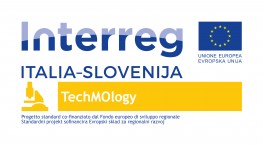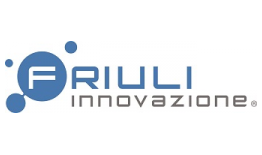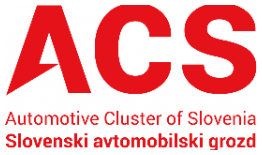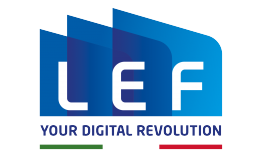Strengthening research, technological development and innovation

Promoting innovation capacities for a more competitive area
TechMOlogy aimed to promote new models of business-research cooperation based on principles of public-private co-investment, open innovation and shared economy to strengthen digital skills and the use of enabling technologies in the mobility supply chain.
TechMOlogy supported the transfer of know-how on emerging technologies decisive for automotive and broader mobility to smaller companies, which represent percentages of the supply chain, contributing to the development of new products and services.
TechMOlogy worked on the preconditions for increasing the use of key enabling technologies (KETs) of Industry 4.0 in enterprises, especially small ones, operating in the mobility value chain. New models of research-enterprise collaboration based on the principles of open innovation, public-private co-investment and sharing of research facilities in the program area were developed and tested. The project facilitated the accessibility of KETs and supported SMEs in the development of new products and services based on them, so as to contribute to the transformative process towards Industry 4.0 of those enterprises with the highest quality craftsmanship know-how, which are one of the assets of the cross-border economy. The verticality of the project on mobility industries is due to their strategic weight in terms of the number of employees/enterprises, high value-added niche processing, and available professionalism. Being technology-intensive sectors, a greater ability to align business models with smart manufacturing by including KETs has generated an improvement in the competitive positioning of the entire area, qualifying the digital skills of the workforce and promoting investment in R&I.
TechMOlogy has strengthened cross-border cooperation among key players in the innovation system based on new models and services, jointly developed during the project and primarily adopted by the partners. The new models were aimed at increasing the involvement of enterprises, especially small ones, in the mobility sector, including by strengthening clusters.
The results for direct beneficiaries:
- Establishment of a permanent observatory on emerging and future technologies most relevant to mobility and automotive in particular
- Construction of collaborations and networks of contacts , aimed at optimizing the use of knowledge and instrumentation available in the laboratories and research centers identified in the program area, with reference to the areas of specialization of Industry 4.0 such as robotics, 3d printing, XR, etc.
- Experimentation with new approaches (design thinking, industrial challenges) to support business competitiveness
Results for indirect beneficiaries of the project (impact on the territory):
- Improved I4.0 technology knowledge and skills among small industry players, - New business models for mobility companies based on the inclusion of enabling technologies
- Collaborations between companies, innovative startups and research centers
- New services and products developed as a result of the skills acquired
Added value and sustainability
The added value of cross-border collaboration was provided by the opportunity to share laboratories and research infrastructure already equipped with tools, space and machinery dedicated to strengthening and developing new skills aimed at Industry 4.0 technologies. Companies in the mobility industry were able to more easily access the wealth of knowledge and advanced technologies in the program area and learn about their potential.
The sharing of technology hubs, business models and industry challenges also increased the exchange of knowledge and information, as well as strengthened the partnership's internal expertise and knowledge.
The scenario analysis on mobility technology trends with recommendations from the expert panel provided a number of useful inputs and recommendations for defining policies, strategies and tools to address market challenges in the coming years, the potential target audience of which are both policy makers and companies in the mobility industry.
The established observatory remains active and will be able to provide analysis, reports, forecasts on trends in areas that influence the development of companies in the field of mobility, thus also to the orientation of regional industrial policies.
Lead Partner

Project partner 1

Project partner 2

Project partner 3
Project partner 4

| Portfolio of "revisited" mobility business services DA8.5_ Service_Design_Portfolio_ITA.pdf ( 333 bytes, published on 5 August, 2024 - 16:30 ) | |
| Portfolio of "revisited" mobility business services DA8.5_ Service_Design_Portfolio_SLO.pdf ( 321 bytes, published on 5 August, 2024 - 16:30 ) | |
| Guidelines for existing laboratories DA7.2_Linee_guida_ITA.pdf ( 1 byte, published on 6 August, 2024 - 12:27 ) | |
| Guidelines for existing laboratories DA7.2_Smernice_SLO.pdf ( 4 bytes, published on 6 August, 2024 - 12:27 ) | |
| Report on main re-skilling/upskilling needs DA4.2_Relazione_esigenze_riqualificazione_ITA.pdf ( 495 bytes, published on 6 August, 2024 - 12:57 ) | |
| Mapping the training needs of SMEs in the cross-border region DA4.2_Allegato1_Mappatura_esigenze_ITA.docx.pdf ( 525 bytes, published on 6 August, 2024 - 12:57 ) | |
| Report on main re-skilling/upskilling needs DA4.2_Poročilo_prekvalifikacija_znanj_SLO.pdf ( 449 bytes, published on 6 August, 2024 - 12:57 ) | |
| Mapping the training needs of SMEs in the cross-border region DA4.2_Priloga1_Kartiranje_potreb.pdf ( 577 bytes, published on 6 August, 2024 - 12:57 ) | |
| Mid and long term scenario analysis on the most promising technological trends in the mobility sector DA4.1_Scenario_Analysis_ITA.pdf ( 11 bytes, published on 8 August, 2024 - 08:57 ) | |
| Mid and long term scenario analysis on the most promising technological trends in the mobility sector DA4.1_Scenario_Analysis_SLO.pdf ( 3 bytes, published on 8 August, 2024 - 08:57 ) | |
| Manifesto for a cross-border re-skilling/upskilling programme DA4.3_Manifesto_programma_riqualificazione_ITA.pdf ( 402 bytes, published on 8 August, 2024 - 10:05 ) | |
| Manifesto for a cross-border re-skilling/upskilling programme DA4.3_Manifest_cezmejni_program_SLO.pdf ( 408 bytes, published on 8 August, 2024 - 10:05 ) |
IMPLEMENTED ACTIVITIES
As per the Financing Contract signed on 20.07.2021 between the LP "Friuli Innovazione Scarl" and the Managing Authority of the Interreg V-A Italy-Slovenija Program and from the approved project plan the project activities have been implemented and the expected results have been achieved. Below is the report of the activities carried out and deliverables produced per WP.
WP 1 - PROJECT MANAGEMENT: The project was officially launched on 01.10.21 with the involvement of all LPs in the preparation of project management and coordination tools. The LP drafted the document Mangement plan (DA1.2, 3.1, 3.2) in order to enable effective cooperation and information exchange among partners. Separately, the work plan (GANTT) with respective timeline was defined. To ensure monitoring and supervision of the project management, a Management Committee was appointed to meet once a semester, meetings were held on 20.04.2022, 19.07.2022 and 07.12. 2022 in conjunction with meetings called Project Status meetings (DA 1.3). The partners met periodically at the Status meetings organized mainly in attendance. Thus, 5 Status meetings were organized and held on 19.01.2022, 20.04.2022, 19.07.2022, 07.12.2022, 12.01.2023. The kick-off meeting was held in Udine on 21.10.21 at the LP - FINN headquarters and gave the operational start to the project (DA 1.1). On that occasion the partners shared the strategy and common working method in order to achieve the expected results. In addition, bi-weekly meetings (bi-weekly on-line meetings) were organized to monitor the progress of activities and critical issues encountered during implementation. The LP made and distributed the evaluation questionnaire on quantitative and qualitative aspects of project management among the partners (the interim and final report on the quality of implementation/project management - DA 3.3 - was then prepared). Monitoring and recording of expenditures as well as reporting was smooth and in line with the expenditure target set per period. There were 5 reporting periods, including the reporting period for additional funds and the final period (DA 2.1). The project was concluded on 01.04.2023.
WP 2 - COMMUNICATION ACTIVITIES: WP Communication activities were also implemented and results achieved according to the approved project proposal. The person in charge of this WP, PP5-LEF activated the project facebook profile, created the bilingual flyer and poster which was displayed at the entrance and/or in a visible place of the partner's building (DC 3.1). Following the mapping of technology facilities, a bilingual Brochure of the I4.0 labs in the program area (DC 3.3) was created and made available to mobility companies. Three bilingual newsletters were drafted for an update on the progress of the project (DC 7.1). For the promotion and launch of the industrial challenges 4 promotional events were realised, exceeding the expected indicator (DC 1.1). The promotional events were held both in Italy and Slovenia, namely at Friuli Innovazione headquarters on 20.10.2022 and on 01.12.2022; at GIZ ACS on 5.10.2022 and at LEF on 13.10.2022. The events were attended by a total of 122 participants both remotely and in person.
More than 100 multimedia contents were posted on social profiles (including institutional ones) on implemented activities and ongoing activities (DC 6.1), in addition, PP5 continuously updated the project website (DC 5.1). With the support of an external IT vendor, a dedicated landing page was created to promote and launch the industrial challenges, as well as digitize the process of collecting ideas and projects that responded to the challenges (DC 3.2). In addition, an infographic summarizing the challenge participation process was created for distribution at promotional events.
At the conclusion of the project, the final cross-border event was organized on 29.03.2023 at LEF headquarters (DC 1.2). The final event was attended by project partners, companies, experts involved, innovation actors, and interested public (34 participants in total). The event was an opportunity to present the results achieved, in particular ample space was given to the projects presented in response to the industrial challenges.
WP 3.1 - STRENGTHENING DIGITAL COMPETENCES: A scenario analysis on the most impactful trends on the mobility industry was conducted and completed, with the identification of 4 strategic sectors (automotive, marine, aerospace, and smart mobility) and 4 reference (enabling) technologies such as 3D printing, robotics, augmented reality, and digitization. The most important output of this WP is the Medium- and Long-term Scenario Analysis on the most promising technological developments for the mobility sector that falls under ATT4 with reference to DA 4.1. As part of ATT5, mapping of potential beneficiaries (companies, schools, institutions, clusters, associations, ...) was carried out in order to better calibrate the needs and target audience of the activities; in addition, technological facilities (research centers, laboratories, demonstrators supporting companies) in the program area (DA 5.1, DA 5.2) were mapped. Within the scope of this WP had been the organization of Demo days, demonstration activities that enabled enterprises and interested public to access the wealth of knowledge and technologies in the program area. A total of 7 Demo days were organized, opening the doors of laboratories and research centers specializing in 3D printing, robotics, augmented reality and digitization equipped with cutting-edge technologies (DA 6.1). A Cross border open day was also organized in Ljubljana on Nov. 25, 2022 with the participation of manufacturing companies from the FVG Region (DA 6.2).
WP 3.2 - NEW RESEARCH-Enterprise BUSINESS MODELS: The aim of the WP was to find new ways to facilitate access to and use of the most advanced Smart Manufacturing technologies to design new products, develop new processes, and offer new services. In this regard, 3 Service Design events with end users were implemented by ECIPA, FINN and SIEVA on 16.6.2022, 14.9.2022, 8.9.2022 (DA 8.4). Based on the results achieved, a revised service portfolio for business in the area of mobility was then developed to reorient and renew its service offerings to support SMEs in the area (DA8.5). Within the scope of this WP was the study carried out by the identified external expert who analyzed the two business models brought by the LP- FINN and SIEVA to try to identify potential new business models in which joint investments between industrial partners and research institutions give rise to laboratories or competence centers on the most advanced enabling technologies. In this regard, deliverable DA7.1 New business models for the use of KETs in the program area was drafted. In addition, the expert prepared Guidelines for governing and directing the work of a technology transfer center/laboratory of advanced technologies (DA 7.2).
WP3.3 - INDUSTRIAL CHALLENGES: The WP3.3. activity represented the CORE activity of the project. The preparatory activity for the industrial challenges were interviews with key stakeholders and/or large companies interested in developing new products and services (DA 9.1). The partners interviewed 26 identified stakeholders and based on the results of the interviews identified and defined 7 most interesting industrial challenges to be submitted to small businesses in the cross-border area in the mobility sector which were called to respond to the Cross-border Call for Proposals (DA 10.1). The industrial challenges were launched at the EC Day on 21.09.2022 (annual event of the Interreg Italy Slovenia Program).
Here is the updated List of Techmology's industrial challenges -> DA_10.1_List of industrial challenges.pdf
The industrial challenges were attended by 11 beneficiaries who were provided with support services and access to laboratories/demonstrators according to a development plan agreed with each team/project (DA9.2). The main activities rendered were: coaching & tutoring, testing, prototyping and validation of the proposed solutions with free access to the identified research labs and demonstrators. In addition, a cross-border basic training workshop on additive manufacturing and a demonstration event in Friuli Innovazione's additive lab were organized. This activity included the establishment and coordination of the technical committee responsible for evaluating the validated papers/projects. The committee met online on 30.03.2023, the members evaluated the submitted papers and drafted an evaluation report with recommendations to the beneficiaries (DA 10.2, DA 11.3).